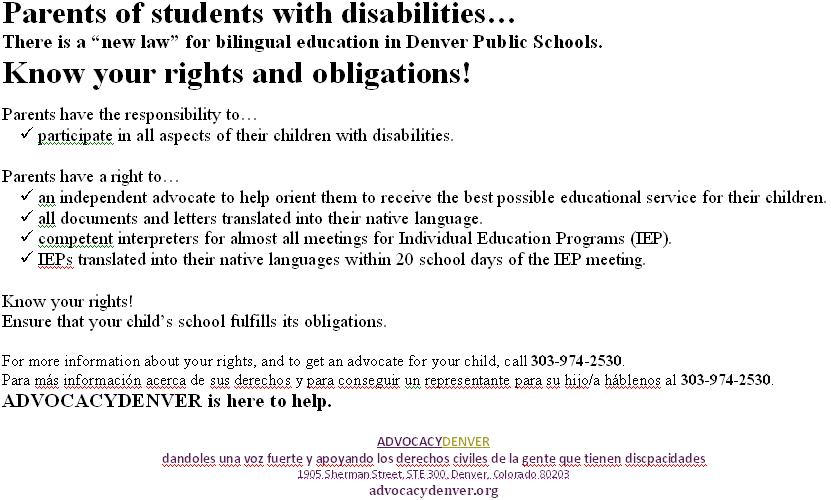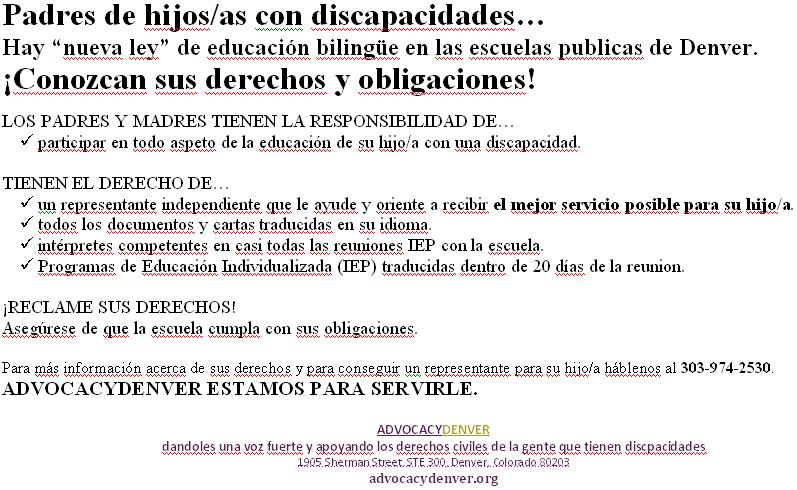In June, Health Care Policy and Financing provided Home and Community-Based Services (HCBS) Day Program service providers and Case Management Agencies (CMAs) of required provisions for additional reopening of Day Program services in congregate settings.
[Read more…] about Day Program Services Expected to Reopen July 20, 2020Promoting Inclusion with Why Not Them?

An Interview with Catherine Strode
Since 2005, Lloyd Lewis has been overseeing all operational and financial management issues of the arc Thrift Stores in Colorado. He has built a strong reputation on his financial management prowess, turning a business that was burning cash into a solid source of revenue for all of the state’s Arc chapters. However, his latest undertaking is earning him recognition as an advocate, and, as a dad. In the book Why Not Them?, Lloyd delves into how the experience of parenting his son Kennedy has changed not only his life but also his life’s mission.
Colorado’s Communities Support Bill To Decrease School Suspensions


An Interview with Catherine Strode
The House Education Committee will hear testimony today on a bill to reduce the number of school suspensions and expulsions of young children in Colorado’s public schools. Data presented by the Colorado Children’s Campaign has shown children in minority populations and children with disabilities face disproportionate disciplinary actions, specifically suspensions and expulsions.
The sponsor of House Bill 17-1210, State Representative Susan Lontine, says the ultimate goal of the bill is to close the achievement gap of children in minority populations and explains the bill’s broad community support.
In interviews with Catherine Strode State Representative Lontine explains how the bill can impact educational disparities in Colorado; and the Vice President of Early Childhood Initiatives for the Colorado Children’s Campaign, Bill Jaeger, explains the suspension data.
[Read more…] about Colorado’s Communities Support Bill To Decrease School Suspensions
Coming Events: Protecting Children’s Futures, a Presentation by Betty Lehman of Lehman Disability Planning
AdvocacyDenver and Denver Public Schools invite Parents, Special Education Teachers and Community Providers to:
Protecting Children’s Futures
a Presentation by Betty Lehman of Lehman Disability Planning

March 14, 2017
6-8:00 p.m.
DSST Stapleton High School
2000 Valentia Street
Topics: Disability and Financial Planning and Legal Considerations, ABLE Accounts Update!
Information: Pamela Bisceglia
Pbisceglia@advocacydenver.org
(303) 974-2526
AdvocacyDenver y las Escuelas Públicas de Denver invitan a padres, maestros de educación especial y proveedores comunitarios a
Proteger el Futuro de los Niños
una presentación de Betty Lehman de Lehman Disability Planning

14 de marzo 2017
6-8 p.m.
DSST Stapleton High School
2000 Valentia Street
Temas: La Discapacidad y Planificación Financial y las Consideraciónes Legales, Cuentas de la Ley “ABLE”
información: Bob McGill
bmcgill@advocacydenver.org
(303) 974-2532
Upcoming Guardianship trainings
New bilingual education laws in DPS
Sensory-Friendly Family Film Screenings!
From the AMC website:
“The program provides a special opportunity for families to enjoy their favorite films in a safe and accepting environment. The auditoriums dedicated to the program have their lights up, the sound turned down and audience members are invited to get up and dance, walk, shout or sing!”
Upcoming Screenings
Locations
The Waiting Period
“How much of human life is lost in waiting.” — Ralph Waldo Emerson
In order to enroll in Medicaid waiver programs in Colorado, adults with intellectual or developmental disabilities (I/DD) must meet certain criteria in determining their eligibility. This criterion, determined by the Colorado Division of Disability, is also used to determine the level of support needed by the individual in order for him or her to lead an active, quality life in our Colorado communities.
Medicaid waiver programs enrollment for individuals with I/DD in Colorado are in great demand. Advocates at AdvocacyDenver oftentimes support clients with enrolling in these programs. Once applied and approved as eligible, clients can anticipate varying wait periods for actual enrollment.. If an individual with I/DD does not apply for enrollment at age 14 –and this can be the case for a plethora of reasons- he or she will end up experiencing a waiting period where access to Medicaid services and supports is limited.
During this waiting period, individuals with I/DD oftentimes refer to natural supports such as friends or family to help them participate within their communities. Community organizations can play a role in helping individuals waiting for Medicaid enrollment too. AdvocacyDenver has a long track record of supporting such individuals with I/DD in locating safe and affordable housing, access to health care, and accommodations in employment. Mission Supports, a new non-profit organization in Denver, is also working to specifically alleviate the barriers experienced by those waiting for Medicaid program enrollment. The organization provides on-going monthly check-ins with adults to identify areas in daily life that they may need support. It also is working towards providing educational opportunities to improve skills such as money management.
While there may not be any imminent decreases in waiting list periods in the near future we, as a community, can continue to be aware of the waiting list for Medicaid disability waiver program and provide our friends, neighbors, and family with support they need while they are waiting.
Inclusion in the School System
Beginning in 1976, AdvocacyDenver (formerly ARC of Denver) has promoted the belief that individuals with disabilities belong in the community and have a fundamental moral, civil and constitutional right to be fully included and actively participate in all aspects of society. The National organization adopted this belief in 1998.
The Individuals with Disabilities Education Act (IDEA) guarantees our children a right to a free, appropriate public education (FAPE) in the least restrictive environment (LRE). Certainly the Denver Public Schools (DPS) provides our children with disabilities a free education; the ongoing debate is in relation to how DPS implements the IDEA, what is appropriate and moreover what is the least restrictive environment. The IDEA provides that:
“To the maximum extent appropriate, children with disabilities will be educated with children who are not disabled, and special classes, separate schooling, or other removal of children from the regular educational environment occurs only when the nature or severity of the disability is such that education in regular classes with the use of supplementary aids and services cannot be achieved satisfactorily.”
Supplementary aids and services means aids, services, and other supports that are provided in accordance with the child’s Individualized Education Program (IEP). Supplementary aids and services must be based on the child’s individual needs and could include: supports to address environmental needs, special equipment, additional adult support, planning time for staff, accommodations in the way subject matter is presented, assignment modifications, test adaptations social interaction support and staff training. In keeping with the spirit and intent of the IDEA, these supports/services are to be provided in general education classes, other education-related settings, and in extracurricular and nonacademic settings to allow the child to be educated with nondisabled peers.
Denver Public Schools asserts that they are in compliance with federal law:
“Department of Special Education is committed to providing an educational experience based upon the individual needs of each child as prescribed and defined by the federal Individual with Disabilities Improvement and the state Exceptional Children’s Education Act. The Department provides specialized instruction for students to minimize the impact of their disability through a continuum of services, ranging from services provided in the general education classroom to fully contained classroom settings.”
AdvocacyDenver asserts that there is a disconnect between what the District outlines in written statements and the actual day-to-day practice of the District and schools. Significant areas of ongoing concern in relation to DPS include, but aren’t limited, to the following:
- The standard practice to assign students with cognitive disabilities to center programs;.
- The standard practice to limit the level of support/services (one-size-fits-all) for children with mild/moderate disabilities enrolled in charter, contract, redesigned, turnaround and/or neighborhood schools;
- The standard practice to provide school principals with the authority to determine whether to accept or refuse a student with a disability for enrollment.
DPS Practice Number 1: Standard assignment of students with cognitive disabilities to center programs.
The district does not exhaust building level interventions or less restrictive educational settings. The IDEA asserts that special classes, separate schooling, or other removal of our children from the regular educational environment occurs only when the nature or severity of the disability is such that education in regular classes with the use of supplementary aids and services cannot be achieved satisfactorily. Parents report that in most cases the school staff are reluctant to try anything outside the norm to accommodate a student with a cognitive disability. In fact, outside the IEP process, school staff will typically tell the parent, exactly what services they can/will provide and the setting in which the services will be provided (e.g. I pull kids out for resource). In some cases school staff will say they would love to have the student attend the school but district special education administration will not provide them with the resources (e.g. paraprofessional staff) to support the student in the general education setting. In this instance school staff is telling the absolute truth. DPS Student Services Program Managers have been carefully coached to categorically deny paraprofessional support and to phrase it in such a way as to not be in blatant violation of IDEA. In addition, it would appear that DPS has crafted a standard and IDEA compliant rationale statement to be included on the IEP of every student who receives services outside the general education setting:
“In order to meet (child’s name) needs in the areas of (name areas, e.g. behavior, math), (child’s name) requires services outside the general classroom as described in his/her IEP.”
Furthermore, many center program students have few if any opportunities to participate in academic, non-academic or school related activities with typical peers. If the short yellow bus transports the student to and from school and the school offers any before or after school activities (e.g. clubs), be assured that the center program student will not be afforded an opportunity to participate in such activities because the District does not offer center program students with before/after school activity transportation. Some children never see the light of day outside of a segregated school setting. In fact, too often inclusive opportunities are limited to eating your lunch in close proximity to nondisabled students because of the mandatory assignment to sit at the lunch table with the center program paraprofessional and other center program students. Both the district and schools offer different excuses. The District asserts that because of school autonomy they can make recommendations about best practices/LRE, but have no authority over school staff or principals. School staff says that the district doesn’t provide enough paraprofessional support staff, or, general education teachers aren’t receptive to including children with more significant disabilities. There is a certain amount of truth to what each side is saying. The district is not terribly generous with resources and sometimes general education teachers do not welcome children with more significant needs. In some instances, special education teachers do not share the value that all children should have an opportunity to participate in activities with typical peers. Student Services leadership is correct in stating that each DPS school has a certain amount of autonomy. The school principal sets the tone for the building and this leader can either encourage segregated programming (separate, “but equal”) or lead a model where different abilities are celebrated and all children are woven into the tapestry of the school community.
DPS Standard Practice Number 2: The practice to limit the level of support/services (one-size-fits-all) for children with mild/moderate disabilities enrolled in charter, contract, magnet, redesigned, turnaround and/or neighborhood schools.
IDEA requires that the school district provide a continuum of services and that decisions be based on the individual needs of the child. The DPS Board of Education has policies (see policy IHBA and IHBA-R Children or Youth with Educational Disabilities) and the Department of Special Education has adopted procedures that comply with federal law. DPS policy IHBA states:
“Denver Public Schools believes that inclusive school communities are those in which all students are valued members of the educational environment and all students have access to, and participate in, opportunities within the school and community at large, based on their strengths, talents and individual needs.”
Yet parents and advocates report that rather than defining services according to the individual needs of the child, school IEP teams frequently craft the IEP according to building level resources or preferred practice. It is not uncommon for the staff at one school to say “we pull kids out and serve them in the resource room” and for the staff at a different school to say “we don’t offer any pull-out, all kids are served in the general classroom” and so on. School staff will frequently say that the district does not provide them with the resources to facilitate a basic continuum of services (consultation, direct services in the general education classroom, direct services outside the general education classroom). Furthermore, there are disparities between the areas/skills an IEP team will target for a student to work on (e.g. social skills/social development). The IEP team at one school will assert that services need only be designed to facilitate the students progress/access to academic programming, while the IEP team at another school will define specific goals in relation to social development and identify the school psychologist/social worker as the provider. Again, school staff will confide that such decisions are contingent on the amount of time a mental health specialist (psychologist/social worker) is assigned to the school; moreover, the individual provider’s level of comfort and training in facilitating mental health services for students with differing disabilities.
DPS special education leadership point to the different department procedures as evidence of compliance but also confirm parent and advocate observations are correct and again, assert disparities are largely a result of school autonomy. School principals are given ultimate authority to determine staffing (e.g. Do I want to purchase 4 hours or 20 hours of psychological/social work services a week.) as well as programming decisions. The school principal establishes the culture of the school and is in a key position to welcome all learners and promote a model that allows for instruction and services based on individual needs. Unfortunately an increasing number of parents and advocates report (and some educators confide) that DPS gives preference to a breed of school principals who deliberately, or at time naively encourage a single model for servicing students with disabilities.
DPS Standard Practice Number 3: The practice to provide school principals with the authority to determine whether to accept or refuse to enroll a student with a disability.
Colorado law regarding school choice allows each school district to adopt policies and procedures in relation to choice for resident and non-resident students. DPS Board of Education policies JC Pupil Assignment and JC-R All Schools – Pupil Assignment Procedures (Revised June 30, 2010) appropriately discuss schools of choice, transfer and assignment procedures.
The issue at hand is the way in which Board policy is being interpreted and implemented. First, it is important to state that DPS’s school model is a moving target. It would appear that within the next few years the district will have eliminated neighborhood schools and instead families will “apply” to have their child enroll at the contract, charter, magnet, special program, turnaround or redesigned school down the street, or across the city. The District does not provide a common application and enrollment process for all of the different school models, except, the Schools of Choice Office has posted two brochures on their web, one discussing procedures for nondisabled students; the second titled “Traditional Choice Application Students with Disabilities.” It is here where the District states: “approval for enrollment of a student with a disability is on the condition that the services outlined in the student’s plan (IEP or Section 504 plan) can be delivered in the school,” and that the principal and the special education teacher (for whom the principal conducts employee appraisals of the school staff) who make this determination. Board of Education policy appropriately does not provide school principals the authority to arbitrarily refuse students with disabilities. However, the fact that students with disabilities are clearly underrepresented in the District’s Charter and magnet schools is likely a direct result of blatantly discriminatory department procedures and the way in which those procedures are applied.
Equally worrisome,, an increasing number of parents report (and some educators confide) that if a child does not perform at an expected level (academically or behaviorally) some school principals will counsel parents to withdraw their child from the school. It is important to remember that contract, charter, magnet, special program, turnaround, redesigned and neighborhood schools are all public schools and as such, have an obligation to serve students with disabilities. Albeit, they do not have to provide a full continuum, but it is expected they will provide basic supports according to the individual needs of the student.
Accordingly,
It shall be the priority for AdvocacyDenver (Agency and educational advocates) staff (educational advocates) to support DPS parents whose children are:
- systematically placed in a center program; or,
- not appropriately being served because the IEP team has failed to consider the type and location of services according to the individual needs of the child; or
- denied enrollment or are encouraged to withdraw enrollment from a DPS contract, charter, magnet, special program, turnaround, redesigned and/or neighborhood school.
Educational advocates will request copies of educational records, in addition to any and all documentation from all members of school staff and District administrators (e.g. emails, data collection, notes) that discuss IEP, program location, school assignment and/or enrollment decisions.
Educational advocates will exhaust school and administrative remedies to resolve issues. When appropriate, an educational advocate will discuss and encourage families to file formal complaints with the appropriate state or federal agency. Agency leadership and legal counsel will determine when and if class action litigation would be appropriate.
Agency leadership and staff will continue to discuss and work with DPS Student Services, other district leadership, DPS Board of Education, and other state and federal agencies to reach resolution regarding systemic concerns.



